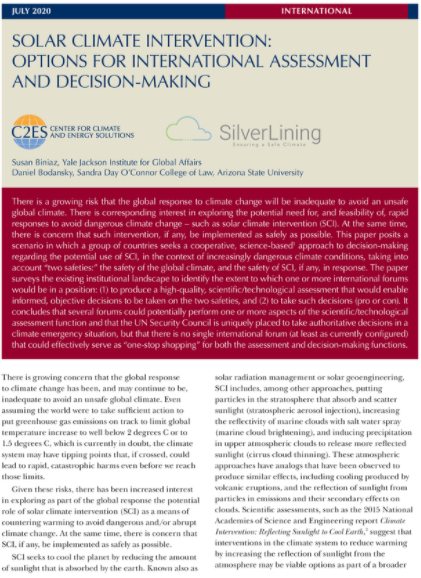SilverLining is concerned with the safety of climate over the next 30-40 years - a period in which warming is projected to continue in even the most optimistic scenarios for emissions reduction - as a matter of social justice. We promote expanded dialogue, scientific cooperation and the development of mechanisms for democratic, science-based international decision-making on responses to the risks of near-term climate warming, including potential climate interventions.
POLICY & DECISION-MAKING FOR SOLAR CLIMATE INTERVENTION: EVENT HIGHLIGHTS
In August 2020, SilverLining held a discussion of considerations for policy and decision-making on solar climate intervention co-hosted by Oliver Morton of the Economist, and Kelly Wanser, Executive Director of SilverLining. The event featured international climate law experts Sue Biniaz and Dan Bodansky, IPCC Vice Chair Ko Barrett, Global South experts Marcos da Silva of the Inter-American Institute for Global Climate Change Research and Penehuro Lefale of the Alliance of Small Island States, and U.S. Congressman Jerry McNerney. [Full video]
April 27, 2021
Think Globally, Govern Locally: Designing a National Research Program on Near-Term Climate Risks and Possible Interventions
By Daniel Bodansky and Kelly Wanser
C2ES and SilverLining have partnered to produce a series of papers to explore considerations and develop practical possibilities for effective international cooperation and decision-making on climate intervention. In the third paper in the series, the authors argue for the establishment of a national research program, outlining the elements of a model program aimed at providing information in a timely, safe, and open manner to allow for evaluation by policymakers and stakeholders and to serve as a model and support for international research and decision-making.
Sept 24, 2020
Climate Intervention Research May be Critical to a More Just and Safe Society
By Kelly Wanser
Climate justice is now essential to addressing social justice, and we need to invest in research on a wide portfolio of options to ensure the health, safety, and the viability of vulnerable communities against a rapidly escalating problem.
October 1, 2020
Climate Intervention: The Case For Research
By Susan Biniaz and Daniel Bodansky
The second paper in a series published by C2ES and SilverLining as part of SilverLining’s International Policy Program describes the role of research in effective international decision-making for climate intervention. In the paper, Biniaz and Bodansky suggest that In order to assess and make science-based decisions about possible climate interventions, governments, stakeholders, and the public need the best possible information about the risks of abrupt changes, the effectiveness, feasibility, and safety of potential interventions, and the comparative risks and benefits of intervention versus no intervention and of different types of interventions.
July 13, 2020
Solar Climate Intervention: Options For International Assessment And Decision-Making
By Susan Biniaz and Daniel Bodansky
In the paper, Biniaz and Bodansky reference that the international response to climate change has been, and may continue to be, inadequate to ensure a safe global climate. They point out that scientific assessments suggest that different forms of solar climate intervention (SCI) may have the potential to reduce warming rapidly, but we do not yet understand their potential impacts and risks. The authors propose key considerations for international decision-making on climate intervention, including consideration of "the two safeties.
July 13, 2020
Toward International Cooperation On Solar Climate Intervention
By Kelly Wanser, SilverLining & Elliott Diringer, C2ES
Wanser and Diringer explore how the absence of sufficient mechanisms for science-based decision-making for climate intervention (geoengineering) poses risks to safety in both climate change and climate response.
July 4, 2019
Montreal Protocol Scientific Assessment Panel: Assessment Of Potential Risks To The Ozone Layer
By United Nations Development Programme
In 2019, the United Nations Montreal Protocol Scientific Assessment Panel passed a resolution to include “solar radiation management research” in its next Ozone Assessment report evaluating potential risks to the ozone layer. This scientific evaluation includes potential direct impacts on the ozone layer, and indirect risks such as stratospheric heating & changes in atmospheric circulation. The proposal was supported by several countries, including the U.S., with no objections.







